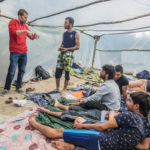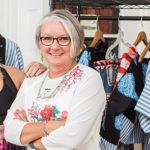JACKSONVILLE, Fla.—Seated with her daughter at a mall food court, Kim Carr noticed internationals in exotic clothing surrounded them and asked: “When did they all get here? Where are they from? Who is reaching them?”
Armed with new sensitivity and prompted by the Holy Spirit, Carr wanted to learn more. She began to make inquiries, and she was introduced to a former Southern Baptist International Mission Board Journeyman who had been praying less than 12 hours before for someone to help with international refugees.
As one of the United States’ 30 refugee intake centers, Jacksonville, Fla., received many people who needed to learn English, and Carr felt God leading her to help people groups unreached by the gospel. So, she completed English as a Second Language certification and almost immediately started teaching classes, beginning at Chinese restaurants.
 Kim Carr (far left) and husband, Ron (far right), meet with Matt and Usha Reifsnider before a worship service at Mandarin Baptist Church Jacksonville, Fla. The Carrs are North American Mission Board missionaries. (NAMB photo by John Swain)Nearly 20 years later, the International Learning Center of Jacksonville, Fla., Inc., has taught English and citizenship to more than 6,000 people from 108 countries. More than 1,500 students have made professions of faith in Christ while establishing more than 94 house-group ministries.
Kim Carr (far left) and husband, Ron (far right), meet with Matt and Usha Reifsnider before a worship service at Mandarin Baptist Church Jacksonville, Fla. The Carrs are North American Mission Board missionaries. (NAMB photo by John Swain)Nearly 20 years later, the International Learning Center of Jacksonville, Fla., Inc., has taught English and citizenship to more than 6,000 people from 108 countries. More than 1,500 students have made professions of faith in Christ while establishing more than 94 house-group ministries.
The International Learning Center now has its own 10,000-square-foot building and curriculum the Southern Baptist Convention’s North American Mission Board hopes to see implemented in cities around the country.
And God did it through a woman who hated English as a subject in school. With a bachelor of science degree in nursing, Carr’s professional expertise was starting and running medical businesses.
“I kept trying to talk God into a clinic, and he kept saying, ‘English,’” Carr said. “That was a huge surprise for me.”
The world comes to Jacksonville
Jacksonville is one of America’s smallest intake centers, but the flow of refugees into the city is diverse. Carr believes most cities have the same mix of immigrants and could use a learning center for internationals.
Sign up for our weekly edition and get all our headlines in your inbox on Thursdays
New refugees face many obstacles once they arrive. Most don’t know English or American culture, and many left their homeland penniless. Although they may be lacking physical baggage, emotional and political baggage often weighs them down. Many are from people groups that are unreached by the gospel and unengaged with Christians.
They flee to America because of threats on their lives, mostly coming from countries where they are leery of Western religion and slow to trust.
“They will trust an American over almost anyone,” Carr said. “They just don’t trust people from their own community, because too many have been killed trusting.”
 Kim Carr (left) and Elham Taylor prepare to host visitors at Taylor’s home in Jacksonville, Fla. Carr leads the International Learning Center in the city to reach refugees. She is a North American Mission Board missionary. (NAMB photo by John Swain)Through the International Learning Center in Jacksonville, Carr and her volunteers focus on teaching English and citizenship skills, which the immigrants typically are eager to learn. As relationships develop, she is able to refer students to “planters” from their language and culture. Those planters become advocates for the immigrants to help them navigate a new and confusing culture.
Kim Carr (left) and Elham Taylor prepare to host visitors at Taylor’s home in Jacksonville, Fla. Carr leads the International Learning Center in the city to reach refugees. She is a North American Mission Board missionary. (NAMB photo by John Swain)Through the International Learning Center in Jacksonville, Carr and her volunteers focus on teaching English and citizenship skills, which the immigrants typically are eager to learn. As relationships develop, she is able to refer students to “planters” from their language and culture. Those planters become advocates for the immigrants to help them navigate a new and confusing culture.
Many eventually join a house group after having a dream or a vision of the Lord.
“They bring trusted family and friends into their group,” Carr said. “They don’t casually bring somebody who just decided to become a believer. They are careful to vet those they bring in.”
The model of partnering a compassion-based program with indigenous planters is the most natural outcome one could hope for, Carr said.
“When you meet people’s needs with excellence, establishing an authentic relationship with them, you are so different than anything they have seen, Carr said. “And they will listen to why you are different.”
Not making converts to a Western religion
Jacksonville’s indigenous planters help immigrants understand following Christ isn’t just a Western religion.
“We don’t want to introduce individuals to a Western religion,” Carr said. “We want them to enter into authentic relationship and worship in a way that is expressed by believers from their nation.”
Usha Reifsnider has Hindu background and serves on the International Learning Center executive team. She’s conducting graduate study at Cambridge University in England on the modern diaspora—the dispersion of people groups from their native lands to live as minorities in new homelands. Reifsnider leads cultural sensitivity training for volunteers.
“I have learned that simply the way we position our bodies and speak to people can cause such lasting damage that you can never share the good news,” Carr said.
One of the International Learning Center’s volunteers who learned to navigate the cultural sensitivities is H.B., who serves as the center’s academic director. A former public school teacher, her vision of cross-cultural work expanded on a trip to Alaska with her home congregation, First Baptist Church of Orange Park. She believes God has gifted her to connect to the nations.
“I have a big heart, but I can’t go to far-away places,” H.B. said. So she serves more than 100 people groups in Jacksonville who come to the learning center.
She is responsible for evaluating incoming students and determining their class placement. The center segregates classes by gender but not by nations.
As the students learn among people from other nations and receive the love of volunteers, attitudes begin to change.
“We wish the world could experience the peace and love that we have found here,” the refugees often tell H.B.
Ministry multiplied thorughout North America
When North American Mission Board leaders discovered Carr and the center, they realized other North American cities need the Jacksonville model. So the agency made Carr the national director and mobilizer of an International Learning Center initiative. Now, she’s working to establish new centers across the United States and Canada.
“I am feeling the weight of it,” Carr said.
She continues to work out of Jacksonville but travels frequently to other cities to implement the International Learning Center template with its proven teaching curriculum.
Carr is a member of Mandarin Baptist Church and receives Annie Armstrong Easter Offering funds from the mission board for her work. Likewise, offering contributions fund the template replication. A key component will be a partnership with local indigenous planters who start house groups in other cities.
Any given year, 25 to 50 people make a profession of faith in Christ at the International Learning Center, and the indigenous planters are reaching an additional 200 per year.
“They take the Living Water to them and enter into the people’s mess,” Carr said. And when they do, she calls that “a beautiful thing.”














We seek to connect God’s story and God’s people around the world. To learn more about God’s story, click here.
Send comments and feedback to Eric Black, our editor. For comments to be published, please specify “letter to the editor.” Maximum length for publication is 300 words.